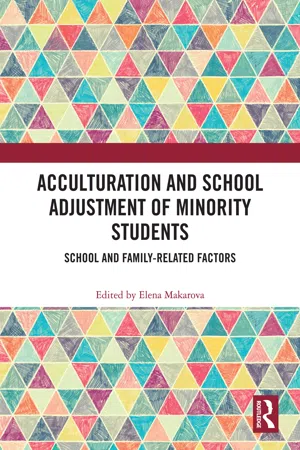
Acculturation and School Adjustment of Minority Students
School and Family-Related Factors
- 160 pages
- English
- ePUB (mobile friendly)
- Available on iOS & Android
Acculturation and School Adjustment of Minority Students
School and Family-Related Factors
About this book
This book discusses the trajectories of minority students' acculturation in terms of school and family-related characteristics that are influential for school adjustment of minority youths.
The process that ethnic minority youth undergo while adjusting to the mainstream culture is known as acculturation. Acculturation outcomes in the school context can be measured in terms of students' psychological well-being and their academic performance. For minority youth, family and school are the two main contexts of acculturation. The aim of the book is to provide multifaceted insights into the challenges that minority students, as well as their parents and teachers, encounter during the acculturation process, and to illustrate the interplay between school and family related factors of minority youths' school adjustment. Research teams from Germany, Hungary, Israel, Russia, Switzerland, and USA report findings from empirical studies on acculturation and school adjustment of minority students in schools of their respective countries.
This book was originally published as a special issue of the journal, Intercultural Education.
Frequently asked questions
- Essential is ideal for learners and professionals who enjoy exploring a wide range of subjects. Access the Essential Library with 800,000+ trusted titles and best-sellers across business, personal growth, and the humanities. Includes unlimited reading time and Standard Read Aloud voice.
- Complete: Perfect for advanced learners and researchers needing full, unrestricted access. Unlock 1.4M+ books across hundreds of subjects, including academic and specialized titles. The Complete Plan also includes advanced features like Premium Read Aloud and Research Assistant.
Please note we cannot support devices running on iOS 13 and Android 7 or earlier. Learn more about using the app.
Information
Teachers as risk and resource factors in minority students’ school adjustment: an integrative review of qualitative research on acculturation
Acculturation and youth’s adjustment challenges
The contextual approach to research on acculturation
Table of contents
- Cover
- Half Title
- Title Page
- Copyright Page
- Contents
- Citation Information
- Notes on Contributors
- Introduction: Acculturation and school adjustment of minority students: school and family-related factors
- 1 Teachers as risk and resource factors in minority students’ school adjustment: an integrative review of qualitative research on acculturation
- 2 Immigrant students and their teachers – exploring various constellations of acculturation orientations and their impact on school adjustment
- 3 Teaching technologies for immigrant children: an exploratory study of elementary school teachers in Russia
- 4 ‘It is hard at school, but I do my best to cope.’: the educational experience of multilingual immigrant youth in high school
- 5 Hidden and actual dropout from the education system among adolescents of Ethiopian origin in Israel
- 6 Emotional school engagement among minority youth: the relevance of cultural identity, perceived discrimination, and perceived support
- 7 Minority parents’ coping efforts to improve their children’s academic achievement: the Tanodas in Hungary
- 8 Peer cultural socialisation: a resource for minority students’ cultural identity, life satisfaction, and school values
- Index
